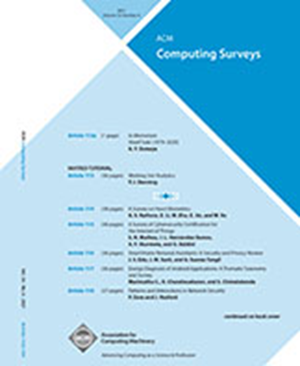Recent Advances of Foundation Language Models-based Continual Learning: A Survey
IF 23.8
1区 计算机科学
Q1 COMPUTER SCIENCE, THEORY & METHODS
引用次数: 0
Abstract
Recently, foundation language models (LMs) have marked significant achievements in the domains of natural language processing (NLP) and computer vision (CV). Unlike traditional neural network models, foundation LMs obtain a great ability for transfer learning by acquiring rich commonsense knowledge through pre-training on extensive unsupervised datasets with a vast number of parameters. Despite these capabilities, LMs still struggle with catastrophic forgetting, hindering their ability to learn continuously like humans. To address this, continual learning (CL) methodologies have been introduced, allowing LMs to adapt to new tasks while retaining learned knowledge. However, a systematic taxonomy of existing approaches and a comparison of their performance are still lacking. In this paper, we delve into a comprehensive review, summarization, and classification of the existing literature on CL-based approaches applied to foundation language models, such as pre-trained language models (PLMs), large language models (LLMs) and vision-language models (VLMs). We divide these studies into offline and online CL, which consist of traditional methods, parameter-efficient-based methods, instruction tuning-based methods and continual pre-training methods. Additionally, we outline the typical datasets and metrics employed in CL research and provide a detailed analysis of the challenges and future work for LMs-based continual learning.基于基础语言模型的持续学习研究进展综述
近年来,基础语言模型(LMs)在自然语言处理(NLP)和计算机视觉(CV)领域取得了显著成就。与传统的神经网络模型不同,基础LMs通过对具有大量参数的广泛无监督数据集进行预训练,获得丰富的常见性知识,从而获得了很强的迁移学习能力。尽管有这些能力,LMs仍然与灾难性遗忘作斗争,阻碍了它们像人类一样持续学习的能力。为了解决这个问题,引入了持续学习(CL)方法,允许LMs在保留所学知识的同时适应新的任务。然而,对现有方法的系统分类和对其性能的比较仍然缺乏。在本文中,我们深入研究了应用于基础语言模型(如预训练语言模型(PLMs)、大型语言模型(LLMs)和视觉语言模型(VLMs)的基于cl的方法的现有文献,进行了全面的回顾、总结和分类。我们将这些研究分为离线CL和在线CL,包括传统方法、基于参数效率的方法、基于指令调优的方法和持续预训练方法。此外,我们概述了CL研究中使用的典型数据集和指标,并详细分析了基于lms的持续学习面临的挑战和未来的工作。
本文章由计算机程序翻译,如有差异,请以英文原文为准。
求助全文
约1分钟内获得全文
求助全文
来源期刊

ACM Computing Surveys
工程技术-计算机:理论方法
CiteScore
33.20
自引率
0.60%
发文量
372
审稿时长
12 months
期刊介绍:
ACM Computing Surveys is an academic journal that focuses on publishing surveys and tutorials on various areas of computing research and practice. The journal aims to provide comprehensive and easily understandable articles that guide readers through the literature and help them understand topics outside their specialties. In terms of impact, CSUR has a high reputation with a 2022 Impact Factor of 16.6. It is ranked 3rd out of 111 journals in the field of Computer Science Theory & Methods.
ACM Computing Surveys is indexed and abstracted in various services, including AI2 Semantic Scholar, Baidu, Clarivate/ISI: JCR, CNKI, DeepDyve, DTU, EBSCO: EDS/HOST, and IET Inspec, among others.
 求助内容:
求助内容: 应助结果提醒方式:
应助结果提醒方式:


